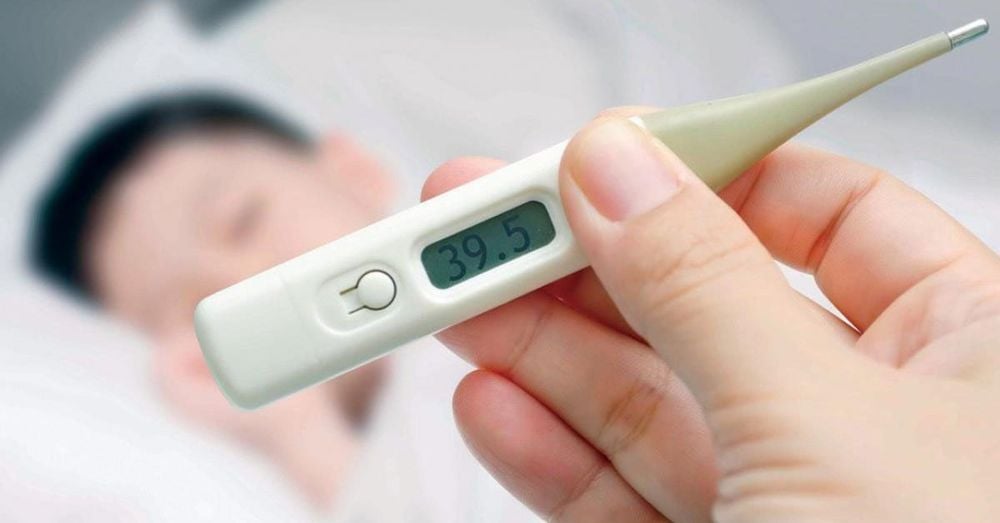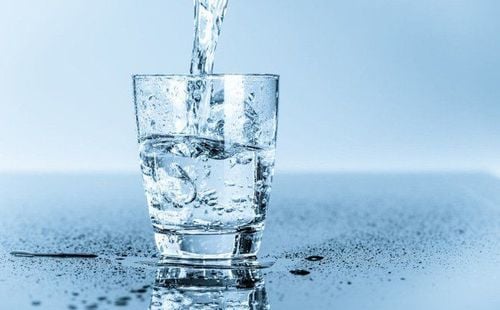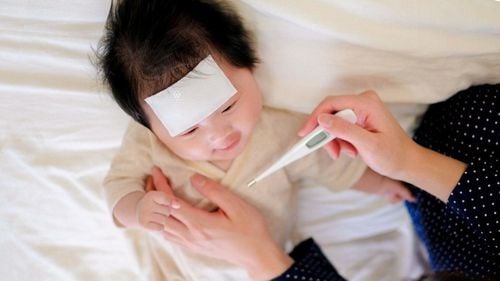This is an automatically translated article.
The article was professionally consulted with resident Doctor Duong Van Sy - Doctor of Pediatrics - Neonatology - Department of Pediatrics - Neonatology - Vinmec Hai Phong International General Hospital.Viral fever is a disease mainly seen in children, the disease is very contagious through the respiratory tract, with typical symptoms being a sudden high fever of 39-40 degrees Celsius. The disease, if not treated properly and completely, will leave behind. many dangerous complications.
1. Dangerous complications of viral fever
The last period of the year is when many diseases broke out across the country due to erratic weather, sometimes sunny, sometimes rainy, so creating favorable conditions for viruses to develop, including viral fever.Viral fever can occur at any age, but children are the most susceptible due to their immature resistance. The disease is usually not dangerous and recovers on its own, but viral fever in children can lead to superinfection if not treated properly and completely, leaving many dangerous complications:
Pneumonia: This is a serious complication and very common with complicated and dangerous developments if it breaks out into an epidemic. Bronchiolitis : Very common when a child under 1 year old has a viral fever and is dangerous if not handled promptly. Laryngitis: Leads to shortness of breath, lack of oxygen in the body. Myocarditis: If the child has no fever but is still tired, can't play, can't eat, it may be myocarditis causing arrhythmia, cardiac arrest.
2. Symptoms of viral fever in children

Digestive disorders: This is a sign. Relatively common signs in children's viral fever, the gastrointestinal tract will often show signs of digestive disorders with manifestations such as loose stools, a lot of mucus and the baby refuses to eat.
Respiratory infections: When you have a viral fever, symptoms of respiratory tract infection may appear at the same time with fever or after a few days of fever with symptoms such as coughing, sneezing, runny nose, red throat..
Swollen lymph nodes: Usually, swollen lymph nodes in the head, neck, and face areas. The lymph nodes are enlarged, painful, and can be seen or felt with your hands. When the lymph nodes are swollen, the baby is extremely uncomfortable.
Some other signs: The rash appears after 2-3 days of fever, when the rash appears, the fever will be better; Conjunctiva of the eye may be red, with discharge, tearing; vomiting may occur after the child eats; The baby is tired, has pain all over the body, and is constantly crying.
3. Treatment of viral fever in children

Regular thermography for the child: The child's temperature will be the number recorded on the thermometer plus 0.3 - 0.4 degrees. For example, if a thermometer records 38 degrees Celsius, the child's actual body temperature is 38.4 degrees Celsius. Fever reduction: When a child has a fever, reduce the child's fever by lying in a well-ventilated room without drafts or heat. room temperature not too lower than body temperature. Cool the child with a cool towel, dry the sweat, wear loose clothes, remove the diaper, remove the blanket for the child when he has a high fever. Note: Do not apply cold water to the child, because it will cause a higher fever due to the peripheral vasoconstriction mechanism. Rehydration of water and electrolytes: Give the child plenty of water, oresol (mix the drug in the correct ratio, if too diluted, it will not provide the necessary amount of electrolytes, if it is too thick, it will lead to an overload of electrolytes) . For babies who are still breastfeeding, give them enough milk. In the case of viral fever in young children > 38.5 degrees Celsius, the mother gives the child antipyretic drugs, usually paracetamol at a dose of 10-20 mg/kg body weight. In case the child cannot drink, use a clean cotton ball to dip the water on his lips and mouth continuously to allow the lining of the lips and mouth to absorb water, avoiding dehydration and electrolytes. Anti-infection: Clean the child's body by wiping with warm water; Change the baby's clothes often. Instill eyes and nose with 0.9% sodium chloride to avoid respiratory bacterial superinfection. Nutrition: When the baby has a viral fever, the mother should give her baby foods that are easy to digest such as porridge, soup, etc. Mothers can divide meals into several times a day so that the baby can eat more. Add vegetables and fruits to your baby's diet to strengthen her resistance. Get enough rest: Giving your child proper food and sleep will help him recover quickly. Mothers should keep the baby out of school for 1 week to fully recover and not spread the disease to other children.
4. Measures to prevent viral fever in children

Preventing viral fever in children by:
Having a reasonable diet to improve the child's resistance. Regularly clean the house and surrounding environment clean and cool to prevent the penetration of harmful agents. Maintain personal hygiene, wash hands before eating, after going to the toilet, limit letting children put toys in their mouths. Fully vaccinated and on time for children. Limit children's contact with infected children or go to crowded places where there is an epidemic. In case the child has a fever above 39 degrees, the use of antipyretic drugs does not respond. Or the child shows signs of lethargy, lethargy, convulsion, continuous and increasing headache, nausea, dry vomiting many times, fever lasting for more than 5 days, the child needs to be taken to the clinic immediately. reputable medical.
To prevent viral fever and other diseases in children, parents should add some supportive foods containing lysine, essential micro-minerals and vitamins such as zinc, chromium, selenium, B vitamins, ... helps to fully meet the needs of nutrients while supporting the immune system, enhancing resistance, reducing the risk of upper respiratory tract infections, bronchitis, flu.
Lysine is very necessary for the development of children, Lysine promotes the production of digestive enzymes to stimulate children to eat better and digest easily and effectively, increase food metabolism, maximize absorption of nutrients. food nutrition. Increasing Lysine for babies also helps the body create antibodies, develop resistance to help relieve cough, thin sputum.
Parents can learn more:
Why do you need to supplement Lysine for your baby?
Please regularly visit Vinmec.com website and update useful information to take care of your baby and family.
Please dial HOTLINE for more information or register for an appointment HERE. Download MyVinmec app to make appointments faster and to manage your bookings easily.














